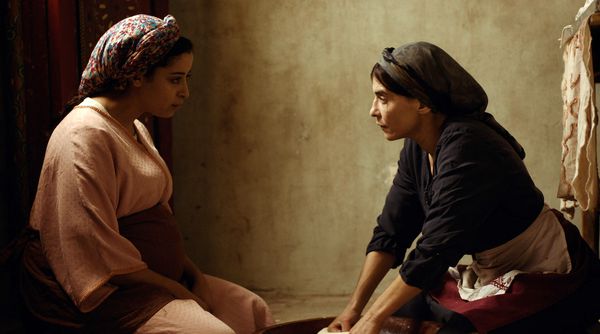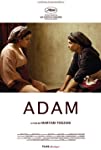Eye For Film >> Movies >> Adam (2019) Film Review
Adam
Reviewed by: Amber Wilkinson

Being an unmarried mum-to-be is not easy in any society - but in Morocco it is also against the law to have sex when you're single. Although jail time is unlikely these days, to be pregnant out of wedlock still makes you a cultural pariah. That means the stakes are raised considerably for Samia (Nisrin Erradi), who we see in the first few minutes of Adam, attempting to find work while heavily pregnant.
A crumb of hope that she might get work as a hairdresser is dashed when she asks if she can sleep in the shop and door after door is shut in her face as she tries to tout herself as home help. Behind one of those doors, however, is Abla (Lubna Azabal), a baker whose every sinew seems to have been pulled taut by stress and grief.

Widowed, Abla lives alone with her sparky daughter Warda (Douae Belkhaouda) and, after realising the pregnant woman is about to sleep rough in a neighbouring doorway, she gruffly brings her in for the night. This is the neat set-up for Maryam Touzani's accomplished debut, that founds its drama on the complex characters she has created. Samia is a determined soul, who refuses to be cowed by Abla's overwhelming desire to control everything, which we can see stems from her attempts to hold in her grief. Warda, meanwhile, is a free spirit flitting between them and, although young and in a supporting role, a carefully crafted character in her own right.
Touzani has no time for throwing a pity party for these women, she shows instead that they deserve our admiration rather than our sympathy. The writer/director has faith in her stars, allowing them to display their characters' conflicted emotions rather than feeling the need to talk them out.
Although the two women have one or two conversations about their respective situations, this is a film built on gesture and a growing mutual understanding. Azabal and Erradi use body language to display their growing affection for one another - with a dance used, not as a sensual lovers' moment, but as a battle of wills and, then, a sensitive exploration of how one woman helps the other reconnect with long repressed emotions. Later scenes, involving bread and the baby - all shot with a Vermeer-like warmth by cinematographer Virginie Surdej - further explore the idea of allowing emotions to resonate in order to deal with them, rather than locking them up and throwing away the key.
Gentle humour is injected by local delivery guy Slimani (Aziz Hattab) and his cumbersome attempts to get Abla to date him but who, notably, is also attracted not by her looks but by her ability to get on with life in the face of adversity. The film tackles similar territory to Meryem Benm’Barek’s Sofia - which also questioned the plight of unmarried mothers - but here the political is kept in the backdrop, so that Touzani stays firmly focused on the women at the film's heart. The question of what will happen when the baby is born hangs over the action - "few things really belong to us," says Samia. This film does.
Reviewed on: 05 Apr 2020















